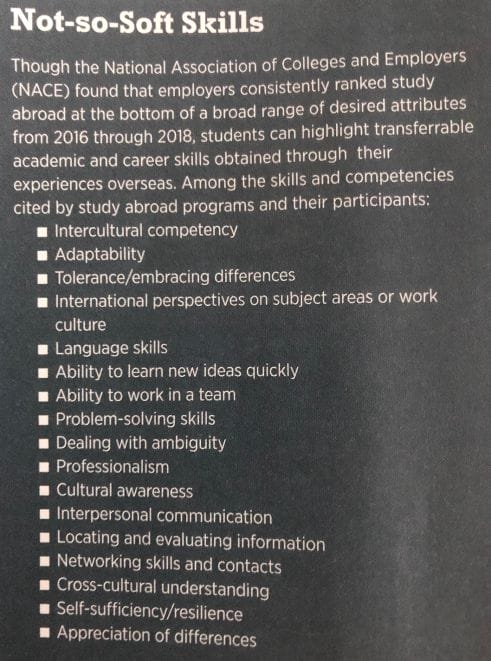
This post is not for the people who have already decided to study abroad, this is for those of you who are thinking about going, but just can’t seem to justify the cost.
I’m not going to lie, an international study experience can be more expensive than a normal semester of education. Even if you decide to go only for the summer, that’s likely to put a dent in your pocketbook; you probably won’t be working, and you’re going to be traveling (double whammy).
We’ve gone over the expenses of studying abroad in another post so you should have a pretty good understanding of those. Rely on your college or university financial aid department and study abroad office, and knowledgeable faculty members, to help navigate your way through it. That’s what they’re there for and they’re great at it. Plus, there are all sorts of scholarships, grants, loans, and other financial aid options available to help fund your study abroad education.
You may even be able to extend your current financial aid package to help cover an international experience. Even so, I bet you’re still wondering how in your right mind can you justify the costs? You’re already in debt and now you’ve got this maniac telling you to go a little deeper.

If you’re going to ask me how can I justify the cost of studying abroad, I am going to ask you how can you justify the cost of college? The point I am trying to make is that you’re already here, why not go a little further. In my opinion, it’s a drop in the bucket long term.
It’s Worth The Investment
If you’re going to ask me how can I justify the cost of studying abroad, I am going to ask you how can you justify the cost of college?
The point I am trying to make is that you’re already here, why not go a little further. In my opinion, it’s a drop in the bucket long-term. So maybe it’s time to re-adjust your perspective.
I have two friends who are now doctors. They both finished their undergrad classes at the University of Michigan, took the MCATs, and neither of them got into medical school. Did they give up their dreams of becoming doctors? Absolutely not!
They got creative and found ways to become more competitive in order to reach their goals. One spent half a year volunteering in South Africa and one spent a year as an EMT on the south side of Chicago.
If you have ever tried to volunteer for something, you quickly learn that you usually have to pay somehow to do it. I’m not talking about a few hours at your local soup kitchen, I am talking third world country stuff. There are three major costs: your flight, room and board, and your time. By the way, just like studying abroad there are services and programs that handle this kind of thing.
Back on point… my friend needed a major credential boost on his resume in order to compete, so he spent half a year of his life in Africa.
The other Wolverine who spent a year as an EMT made huge investments, as well (mainly time and safety). If you’re not aware, EMTs don’t make much. So living in Chicago with his entry level salary did not stretch too far.
Bottom line: with this added competitive edge, they they both got into really good med schools and now live in vibrant cities doing what they always wanted to do. Talk about using your problem-solving skills. If they could do it, so can you.

Change Your Psychology Be The Stand-Out Job Candidate
For years the international experience has been viewed on campuses as an activity reserved for the wealthy kids to get cultured. This is simply not the case anymore. Medical school is extremely competitive. To even get in the ballpark you have to have a good undergraduate GPA at a decent university, and do well on the MCATs. But as we now know, sometimes even that isn’t enough.
If these two guys drastically altered their lives to get where they wanted to be, why wouldn’t you do the same using a semester abroad to bulletproof your resume? And I’m not just talking about med school.
This applies to any academic path you choose.
Studying at home, in your own country, is so past-tense. These days, to get the most out of your higher education and what you’ve invested in it – from undergrad degree work to a more advanced MBA program – you need to study abroad.
HR professionals at major corporations complain regularly about the lack of international talent among their recruits and practically beg colleges and universities to develop it. Schools have been responding by offering a variety of international study programs for their students.

Harvard Business School even sends their first-year MBA class to locales around the globe for international studies. But I think one of the most compelling endorsements for study abroad has come from Michelle Obama who says that “overseas study is not just great for the individual but is a vital part of America’s foreign policy.”
If you’re on the fence about studying abroad, change your mindset and think about it as a way to be a competitive candidate in whatever job you want to get upon graduating.
The adventures, memories, and friends just happen to be a big bonus. If you have the opportunity for this once-in-a-lifetime cultural and learning experience, don’t miss out on it because you’re worried about your pocketbook. It WILL pay off in the end.
This is a good time to remind you that students studying abroad also improve their foreign language skills. It’s a fact that nothing is more effective in increasing language proficiency than living it first-hand. Fluency in another language – picture what a bonus that will be on your resume.
Do The Math
From the graphic above we know that:
- 70% of college students graduate with debt
- They owe $29,000/each
- Which equals $300/month over 10 years
Let’s assume the average debt is $36,000 because you studied abroad. Ok, fine. But study abroad students earn more on average than non-study abroad students…
A British study found their study abroad graduates out-earned their peers by 17%. This equates to approx. $7,000 annually for U.S. students and £3,120 for UK students. Maintaining this earning advantage translates to earning an extra $567,500 over one’s career in the United States.
Without doubt, the pros outweigh the cons. Now that you know what a tremendous benefit international study can be, the question isn’t how can you afford to study abroad, but how can you afford not to!?